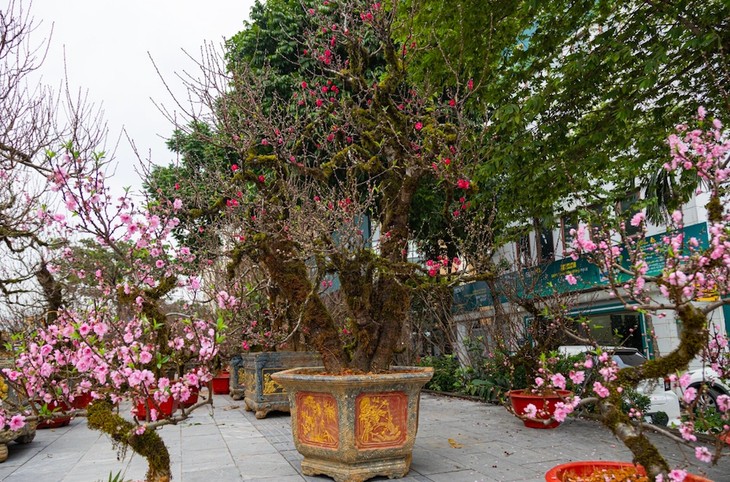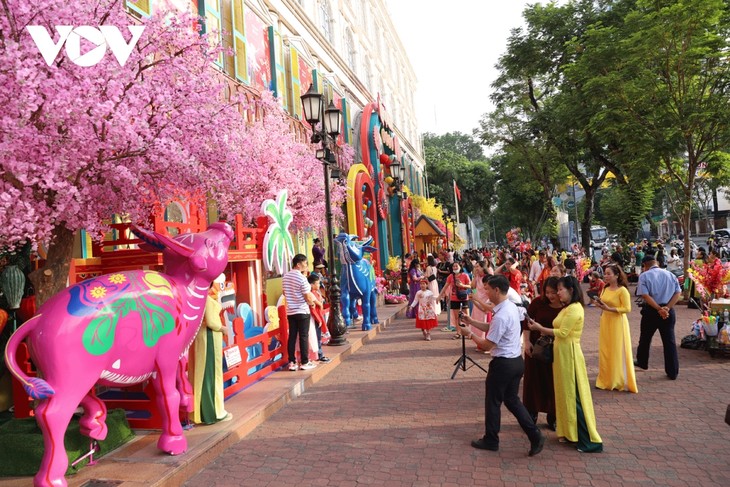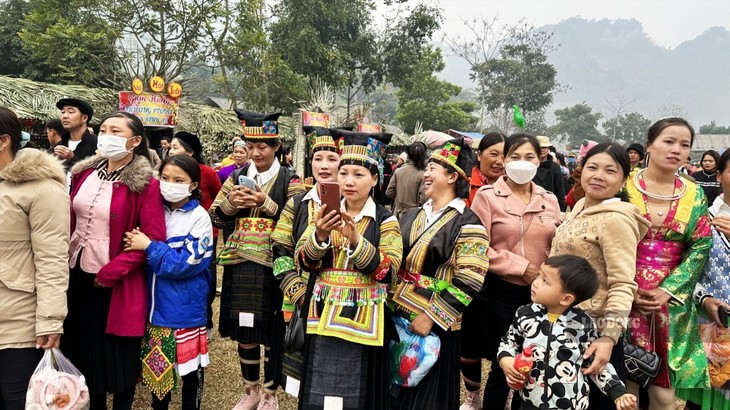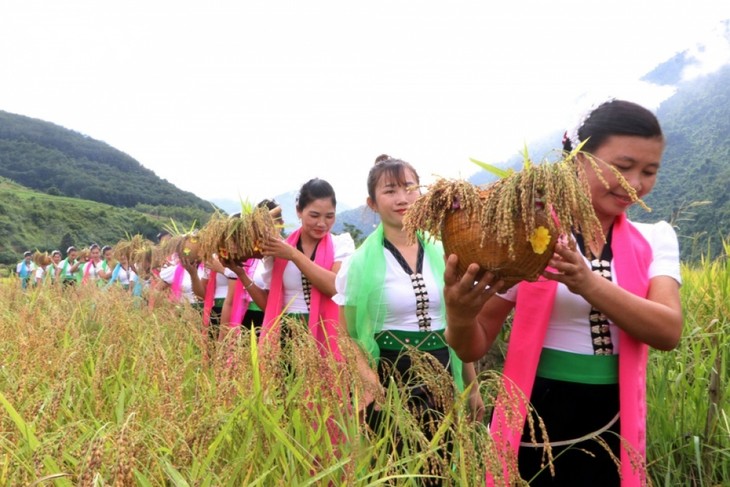 Peach flower trees are sold on many streets in Hanoi a few weeks before Tet 2024. (photo: VOV) Peach flower trees are sold on many streets in Hanoi a few weeks before Tet 2024. (photo: VOV) |
B: Here in Vietnam, we are now busy preparing for our lunar New Year Festival, our biggest celebration of the year.
A: It seems that during the New Year holiday, our listeners had more time to write to us. Last week, VOVWorld received 460 letters, emails, and phone calls from 32 countries and territories.
B: We continue to receive greetings and comments on New Year events in Vietnam. Many of our listeners have asked about the atmosphere in the days before Tet and what Vietnamese families do to prepare for Lunar New Year, we call it Tet in Vietnamese.
A: The Lunar New Year is a national holiday, along with National Day on September 2nd, Labor Day on May 1st, and National Reunification Day on April 30th.
B: The Lunar New Year is celebrated on multiple days. This year we have 7 days off from work and school, from February 8th to February 14th. Other countries that celebrate the Lunar New Year are China, North and South Korea, Malaysia, the Philippines, Indonesia, Singapore, and Brunei. A: Family bonds take center stage at this time – the traditional Tet reunion. People who have been working far from home try to return to their hometown to spend the holiday with their family.
 People in Ho Chi Minh take photos with new decorations to welcome Tet. (photo: Ty Huynh) People in Ho Chi Minh take photos with new decorations to welcome Tet. (photo: Ty Huynh) |
B: With just three weeks remaining before Tet, people in Vietnam are trying to complete all unfinished business, pay off all debts, and clean and decorate their home so as to be ready to greet the New Year with a positive mindset and a compassionate spirit.
A: Tet is a time for worshiping rituals and family feasts, so families will stock a lot of things to eat and place on the family altar. Although wet markets and supermarkets will stay open until the last day of the old year and will reopen on the second day of the new year, people still try to stock up on food before Tet. Many food items symbolize luck and prosperity.
B: Many of our news stories at this time of year are about activities to care for people in difficult circumstances by giving them Tet gifts of cash, staple goods – even houses – and organizing free buses to take workers to their hometowns. Having sufficient food for Tet represents prosperity and a better life in the new year.
 Traditional clothes of black Mong women in Tuyen Quang province (photo: VOV) Traditional clothes of black Mong women in Tuyen Quang province (photo: VOV) |
A: Our segment “Colorful Vietnam, Vietnam’s 54 ethnic groups” always draws a lot of interest. Listeners say they enjoy hearing about the cultural differences between ethnic groups in Vietnam.
B: Chinaka Onu wrote on our website that he doesn’t really understand the meaning of ‘ethnic minorities’ as it applies to Vietnam.
A: Under Vietnamese law an ethnic majority is an ethnic group whose population accounts for over 50% of the total population of Vietnam according to the national census. An ethnic minority is any other ethnic group living in Vietnam.
B: Vietnam has 54 ethnic groups in all. The 82 million people of the Kinh group, the ethnic majority, comprise 86% of Vietnam’s population. The other 14% of the population includes 53 different groups of ethnic minority people. The Kinh majority are spread over every region, but most of the minority groups – except for the Cham, Hoa, and Khmer – live in the mountains, highlands, and remote regions along the northern and western borders of Vietnam.
 White Thai people in Muong So commune, Phong Tho district, Lai Chau province, celebrate Young Rice Festival. (photo: VOV) White Thai people in Muong So commune, Phong Tho district, Lai Chau province, celebrate Young Rice Festival. (photo: VOV) |
A: Vietnam’s Constitution recognizes all ethnic groups as equal. The Party and State have made substantial efforts to develop and enforce national policies which support cultural and ethnic diversity, ensure equal development, strengthen solidarity, promote mutual support, raise living standards, reduce poverty, broaden education, and reduce socio-economic disparity between the ethnic groups.
B: We’re very happy to hear that listeners have received our new QSL cards. Reginaldo of Brazil thanked us for sending him a QSL card with a beautiful photo of Hanoi’s Old Quarter.
A: Jayanta Chakrabarty of India said he received a QSL card depicting the picturesque Hang Khoai-Hang Luoc intersection in Hanoi's Old Quarter for his report dated November 14, 2023.
B: Other QSL cards feature clouds seen from the Ta Xua mountain peak in Son La province; gorgeous Ba Khan lake in Hoa Binh province, which resembles a giant pan with rocks of all shapes and sizes emerging from the water; and Son Tra peninsula, a national park that boasts a stunning beach, a dense rainforest, a majestic mountain, and rare animals. We send QSL cards to confirm listeners’ reception reports each week. We hope you’ll receive one soon. Let us hear from you.
A: Fachri of Indonesia reported listening to VOV’s English language broadcasts to Asia on January 10th on the frequency of 9840 kHz. He rated SINPO all 4s. He noted details including the Vietnamese President receiving the New Zealand and Peru Ambassadors and the Indonesian President’s visit to Vietnam.
B: M.S. Sreenivasa Raju of India told us that reception on 11885 kHz was good, with a SINPO of 34443. He said he enjoyed listening to VOV’s news and Vietnamese songs, and attached an audio clip recorded at the end of the broadcast.
A: Abdul Mannan of Bangladesh tuned in to VOV’s English program on January 10th on the frequency of 7220 kHz. The broadcast had a good signal and clear sound, with SIO all 4s, he said.
B: Malik Allah Bachaya Khokhar of Pakistan told us: “The English language programs provide a wealth of information to listeners worldwide. These programs play a crucial role in enhancing my language skills. They’re an invaluable resource for language learners.”
A: He said: “One of the key strengths of radio programs is their accessibility. Listeners can tune in from various locations and backgrounds, making it a democratic platform for language education. This inclusivity fosters a sense of global community among language learners, creating connections and shared experiences.”
B: We welcome your feedback at: English Service, VOVWorld, the Voice of Vietnam, 45 Ba Trieu street, Hanoi, Vietnam. Or you can email us at: englishsection@vov.vn. You’re invited to visit us online at vovworld.vn, where you can hear both live and recorded programs.
A: Check out our VOV Media App, available on both the IOS and Android platform, to hear our broadcasts. We look forward to your feedback on the mobile version of vovworld.vn. Once again, thank you all for listening. Goodbye!